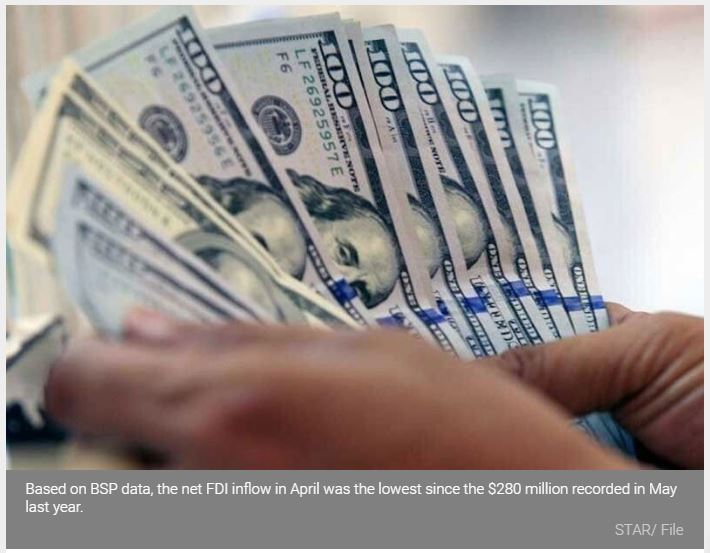Philippines: FDI inflow drops to near-year low
MANILA, Philippines — The net inflow of foreign direct investments (FDIs) plunged by 68 percent to hit an 11-month low of $311 million in April from $971 million in the same month last year as many investors put on hold their plans amid the uncertainties brought about by the COVID-19 pandemic, according to the Bangko Sentral ng Pilipinas.
Based on BSP data, the net FDI inflow in April was the lowest since the $280 million recorded in May last year.
“The slowdown in FDI inflows reflected the continued weak global and domestic demand prospects, prompting many investors to put on hold investment plans amid the unresolved COVID-19 pandemic,” the BSP said.
The central bank said the drop in April was due to the 73.2 percent plunge in non-residents’ investments in debt instruments consisting mainly of loans extended by parent companies abroad to their local affiliates to $223 million in April from $832 million a year ago.
Preliminary data released by the BSP also showed a 15.8 percent decrease in reinvestment of earnings to $81 million in April from $96 million in the same month last year.
The BSP also reported that equity infusions to manufacturing, wholesale and retail trade, as well as real estate sectors declined by 68.3 percent to $47 million in April from $147 million a year ago. The bulk of the amount mostly came from Japan, the US, Singapore and Germany.
Likewise, equity withdrawals also fell by 62.5 percent to $39 million from $104 million.
From January to April, net FDI inflow dropped by 32.1 percent to $1.98 billion from $2.92 billion in the same period last year as investments in debt instruments fell by 53 percent to $1.05 billion from $2.23 billion, while reinvestment of earnings retreated by 21.7 percent to $269 million form $343 million.
Equity placements inched up by 4.4 percent to $761 million from January to April compared to $729 million in the same period last year, while withdrawals plunged by 74.3 percent to $100 million from $390 million.
Security Bank chief economic Robert Dan Roces said the main factor behind the decline in FDIs is still the uncertainty brought about by the COVID-19 pandemic.
“I believe we are not unique as an emerging market in seeing FDI inflow drops,” Roces said.
Nevertheless, Roces said the drawdown should provide leeway in improving infrastructure and other incentives to encourage more investments and push economic recovery
“This on top of the fact that we still offer many comparative advantages, including an English-speaking and well-skilled workforce, and a geographical location in a dynamic region,” Roces said.
For his part, Union Bank of the Philippines chief economist Ruben Carlo Asuncion said the “cratering” of the FDI level in April was expected.
“We all know that April was the main month of the economic lockdown versus the COVID-19 spread. FDI outlook this year is mainly hinged on the result of the government’s effort to get a grip on COVID-19’s spread locally, the level of fiscal support by the government to the flailing economy, and the discovery and consequent administration of an effective vaccine versus the said novel coronavirus and/or the deployment of working therapies and anti-viral drugs,” Asuncion said.
Asuncion said he is not discounting a potential steady recovery of FDI sentiment globally with the passage of various fiscal stimulus packages, especially among advanced economies where FDIs come from.
“At this point, I believe that the worst is over for FDI inflows, though we still have to wait for both May and June data, and its subsequent declines and the medium- to long-term prospects seem to look more positive compared to previous months,” Asuncion said.
Source: https://www.philstar.com/business/2020/07/23/2029864/fdi-inflow-drops-near-year-low


 English
English




